Officials from around the world reach climate change draft agreement
- Get link
- X
- Other Apps
Story highlights
- World leaders and activists urge a firm commitment to making a difference
- Government officials will work next week in Paris to get a complete, final agreement
- Many have called for action, though getting everyone on the same page is a challenge
(CNN)Negotiators from 195 countries agreed Saturday on a blueprint deal aimed at reducing global carbon emissions and limiting global warming, a significant but far from conclusive step in the multinational effort to keep climate change in check.
The United Nations Framework Convention on Climate Change (UNFCCC) posted on its website a copy of the draft agreement, which officials have been working on intensively for some time.
The document addresses deforestation, food security, poverty and a host of other issues, with chunks of the document focused on what developed countries can do to reduce carbon dioxide missions by a yet to be determined level by 2050.
This includes what they can do to help other countries. To this point, one line in the draft states, "Developed countries shall provide developing countries with long-term, scaled-up, predictable, new and additional finance, technology and capability-building."
Officials will now work through next week at the COP21 conference in Paris to craft a complete, final agreement.
Doing so may not be easy, but that didn't stop those involved in the process from celebrating Saturday's announcement.
"One more step in writing of history," tweeted Christiana Figueres, the executive secretary of the UNFCCC. "#ADP adopts the Draft Paris Outcome and forwards it to #COP21 for finalizing."
Can the world reach an effective deal?
Saturday's announcement comes days after leaders from around the world -- including Russian President Vladimir Putin, Indian Prime Minister Narendra Modi and German Chancellor Angela Merkel -- gathered in the French capital for the conference's kickoff. At the time, U.S. President Barack Obama expressed optimism that a deal would be struck.
"I think we're going to solve it," Obama said. "I think the issue is just going to be the pace and how much damage is done before we are able to fully apply the brakes."
Many officials have talked about the importance of doing something to slow the pace of global climate change, aiming specifically to hold global average temperatures short of a 2 degrees Celsius increase over pre-industrial global temperatures.
Having legally binding reductions in greenhouse gas emissions has long been seen as a priority to make this happen.
But getting every country in the world on the same page -- since even a few bad eggs could tilt the scales in the wrong direction, even if everyone else is doing their part -- has proven difficult over the years. It's also complicated to implement measures that have effective consequences for those who don't do their part.
'We can. We must. We will act on climate change'
In comments posted Saturday to Twitter, Figueres gave a sense of urgency and optimism to this challenge when she said, "We can. We must. We will act on climate change."
Segolene Royal, France's environmental minister, added that it's not that people don't know what has to be done. They just need the will -- politically and otherwise -- to make it happen.
"We have the solutions to climate change," Royal said, according to another U.N. tweet. "We just need to deploy them."
This sentiment was echoed by U.S. astronaut Kjell Lindgren, who expressed hope "that leaders from around the world will find common ground" from his current home on the International Space Station.
"Whether you're a government, a business, a university or an individual, you can make a difference," he said.
Back on Earth, in Paris, several speakers -- including current Paris Mayor Anne Hidalgo and former New York Mayor Mike Bloomberg -- similarly rallied people to the cause Saturday, which the U.N. characterized as "Action Day."
One of the speakers, actor Sean Penn, said, "If there's something to move forward with forests, to reclaim the environment, to create economic opportunity and to protect these vital human rights, it's in no longer being afraid to make commitments to do so. ... Join us ... in making a commitment and in being under the scrutiny of our children in 10 years from today."
CNN's Vasco Cotovio and Susanna Capelouto contributed to this report.










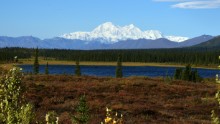
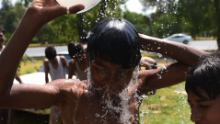
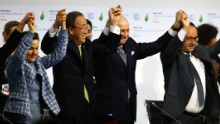
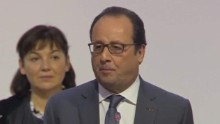
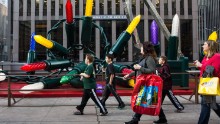






Comments